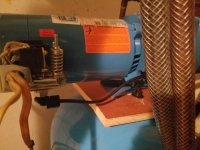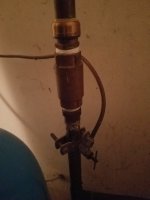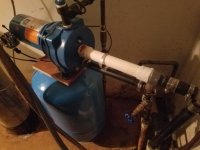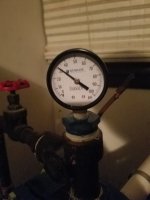Pktaske
Member
...and its causing rapid on/off switching.
Two line above ground jet pump pressurizes to 50 psi without issue. Immediately after it shuts off, the pressure on the head drops to 30ish (see pic). It then immediately kicks in again and shoots to 50, at which point it stops, drops again and restarts. Rinse. Repeat. Lights flicker. Etc.
What were doing now is shutting the pump off manually after pump pressurized to 50 and turning it on when pressure eventually drops from using water in the house.
Note that the pressure continues to slowly drop by 1 to 2 psi every 10 minutes. Again, this is only on the pump head gauge. The house keeps pressure fine as there is a check valve in the line going to the house line.
I'm thinking I've got a leaky check (foot?) valve at the bottom of my well or a leak in the line? But I don't think a simple line leak would cause that immediate 20 psi drop.
Right now the switch gets a pressure feed from the pump head. A short term fix would be to tap into the water line (after the check valve) and have the switch operate on house pressure hence isolated from the pressure plagued head/well system. I could also leave the switch as is and install a big 1 1/2" check valve in the suction line coming into the pump head.
I haven't lost prime yet even after the pump being off for 24+ hours. At that point the pump head pressure is showing 0 but when turning on it immediately shoots to 30 psi and pumps quickly to 50 (where of course it again starts to rapidly cycle).
Think I have this diagnosed correctly?
Would the above fix work?
What is long term solution?
Two line above ground jet pump pressurizes to 50 psi without issue. Immediately after it shuts off, the pressure on the head drops to 30ish (see pic). It then immediately kicks in again and shoots to 50, at which point it stops, drops again and restarts. Rinse. Repeat. Lights flicker. Etc.
What were doing now is shutting the pump off manually after pump pressurized to 50 and turning it on when pressure eventually drops from using water in the house.
Note that the pressure continues to slowly drop by 1 to 2 psi every 10 minutes. Again, this is only on the pump head gauge. The house keeps pressure fine as there is a check valve in the line going to the house line.
I'm thinking I've got a leaky check (foot?) valve at the bottom of my well or a leak in the line? But I don't think a simple line leak would cause that immediate 20 psi drop.
Right now the switch gets a pressure feed from the pump head. A short term fix would be to tap into the water line (after the check valve) and have the switch operate on house pressure hence isolated from the pressure plagued head/well system. I could also leave the switch as is and install a big 1 1/2" check valve in the suction line coming into the pump head.
I haven't lost prime yet even after the pump being off for 24+ hours. At that point the pump head pressure is showing 0 but when turning on it immediately shoots to 30 psi and pumps quickly to 50 (where of course it again starts to rapidly cycle).
Think I have this diagnosed correctly?
Would the above fix work?
What is long term solution?




